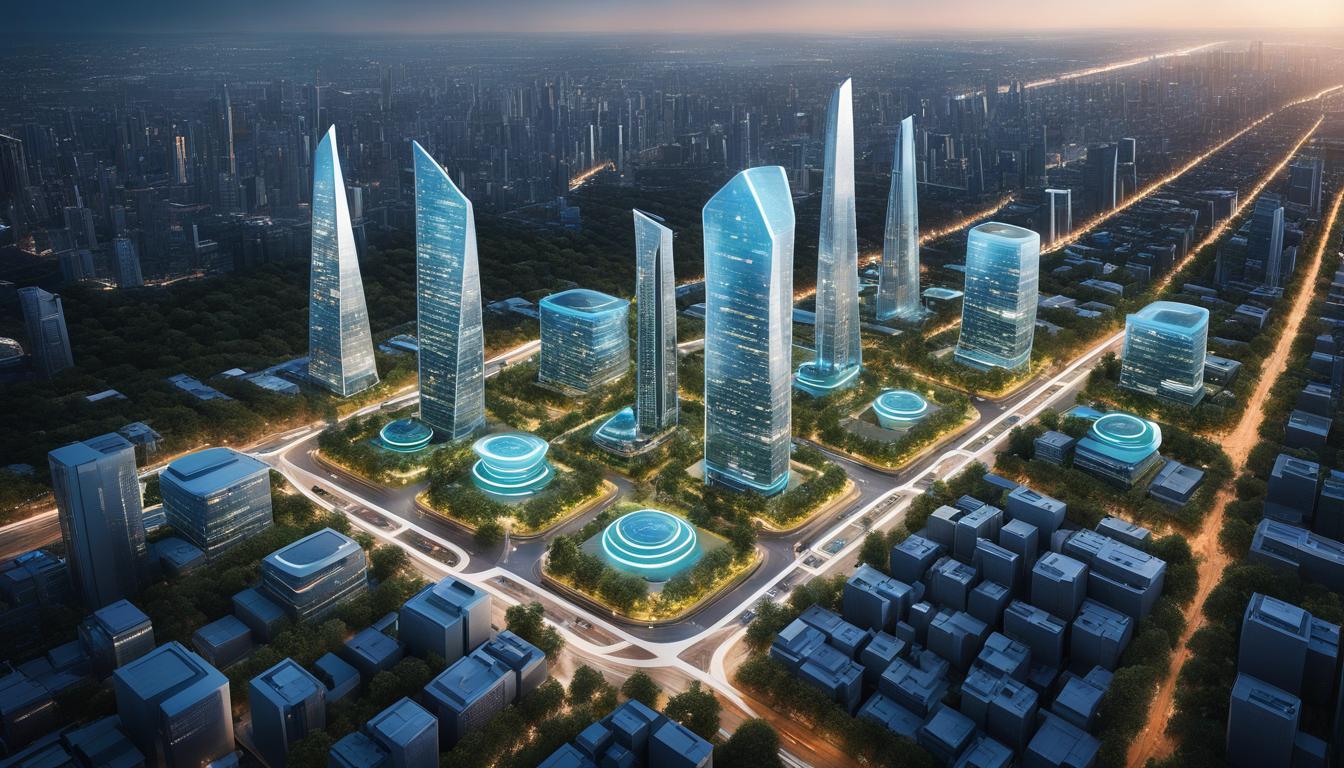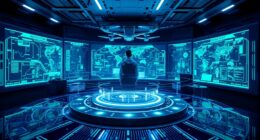Discover the upcoming trends in city living – AI-powered smart cities. With the fast-paced development of artificial intelligence and smart city technology, our cityscapes are experiencing a momentous transformation. Intelligent urban infrastructure, driven by AI, is leading the path to cities that are not just more streamlined but also eco-conscious. AI is reshaping our city lifestyle by enhancing healthcare and optimizing transportation systems.
Artificial intelligence in cities is no longer a distant dream but a tangible reality. It is driving the transformation of various sectors, enhancing personalization, and automating processes. With AI’s limitless potential, smart cities are becoming smarter, more connected, and environmentally sustainable.
Join us as we explore the incredible potential and impact of AI-powered smart cities. Discover how AI is revolutionizing industries, enhancing personalized experiences, breaking language barriers, and optimizing processes to create efficient and sustainable urban environments.
Key Takeaways:
- AI-powered smart cities are the future of urban living, transforming industries and enhancing personalization.
- Artificial intelligence optimizes processes, improves efficiency, and streamlines transportation, healthcare, and education.
- AI-powered translation tools break language barriers, enabling global communication and collaboration.
- Smart cities driven by AI technology prioritize energy optimization and environmentally sustainable practices.
- AI enhances citizen experiences, improves public safety and security, and fosters efficient resource management.
Revolutionizing Industries with AI
AI-driven solutions are transforming industries by optimizing operations, enhancing decision-making, and driving growth. In the healthcare sector, predictive algorithms powered by AI are revolutionizing patient care, leading to improved outcomes and better healthcare management. These algorithms analyze massive amounts of data to predict disease patterns, identify at-risk patients, and prescribe personalized treatment plans.
For instance, AI-driven predictive analytics can analyze patient data and identify patterns that human healthcare providers may miss, enabling early detection and proactive interventions. This leads to better patient outcomes, reduced healthcare costs, and improved overall population health.
In finance, AI-driven analytics are reshaping investment strategies and decision-making processes. By leveraging AI algorithms, financial institutions can analyze vast amounts of data, identify market trends, and make data-driven investment decisions. This not only improves the accuracy of investment predictions but also enhances portfolio management and risk assessment.
| Industry | AI-driven Solutions |
|---|---|
| Healthcare | Predictive algorithms for personalized treatment plans |
| Finance | AI-driven analytics for investment strategies |
| Manufacturing | AI-powered automation for optimized production processes |
| Retail | AI-driven data analysis for personalized marketing campaigns |
Furthermore, AI-driven solutions are streamlining processes, allowing human resources to focus on tasks that require creativity and critical thinking. By automating routine and repetitive tasks, AI frees up valuable time and resources for more strategic and innovative initiatives.
“AI is revolutionizing industries by optimizing operations, enhancing decision-making, and driving growth.”
With AI-driven solutions, industries can unlock new insights, improve efficiency, and stay ahead in a fast-paced and competitive market. By embracing AI technologies, businesses can thrive in a rapidly changing landscape and capitalize on the opportunities presented by AI-driven analytics and predictive algorithms.
Enhancing Personalization and User Experience with AI
Personalized experiences, tailored marketing campaigns, AI algorithms
In today’s digital landscape, AI is at the forefront of creating personalized experiences that captivate users and enhance their overall satisfaction. Through the power of AI algorithms, businesses can now tailor content recommendations, marketing campaigns, and user experiences to cater to individual preferences.
By leveraging advanced AI techniques, companies can collect and analyze vast amounts of data to gain valuable insights into user behavior, preferences, and interests. With this information, they can deliver customized experiences that resonate with each user on a personal level, ensuring higher engagement and conversion rates.
“AI algorithms enable businesses to gain a deep understanding of their users and deliver tailored experiences that go beyond their expectations.”
Personalized Content Recommendations
Thanks to AI algorithms, users can now enjoy personalized content recommendations that align with their interests and preferences. Whether it’s a video streaming platform suggesting similar shows based on viewing history or an e-commerce website showcasing products tailored to individual tastes, personalized content recommendations improve user engagement and keep them coming back for more.
Tailored Marketing Campaigns
AI algorithms enable businesses to develop tailored marketing campaigns that resonate with their target audience. By analyzing user data, such as demographics, browsing history, and purchasing behavior, AI algorithms can identify the most effective marketing messages, channels, and timing to deliver personalized and compelling campaigns that drive conversions and customer loyalty.
Enhanced User Experiences
When it comes to user experiences, personalization is key. AI algorithms help optimize user interfaces, navigation flows, and app interactions to suit individual preferences. By understanding user behavior patterns and preferences, businesses can create user experiences that are intuitive, efficient, and seamless, resulting in higher user satisfaction and increased brand loyalty.
Overall, AI-powered personalization is transforming the digital landscape by delivering tailored experiences that cater to individual preferences. From personalized content recommendations to tailored marketing campaigns and enhanced user experiences, AI algorithms are revolutionizing how businesses interact with their customers online. By harnessing the power of AI, businesses can create meaningful connections, foster long-term customer relationships, and stay ahead in today’s highly competitive market.
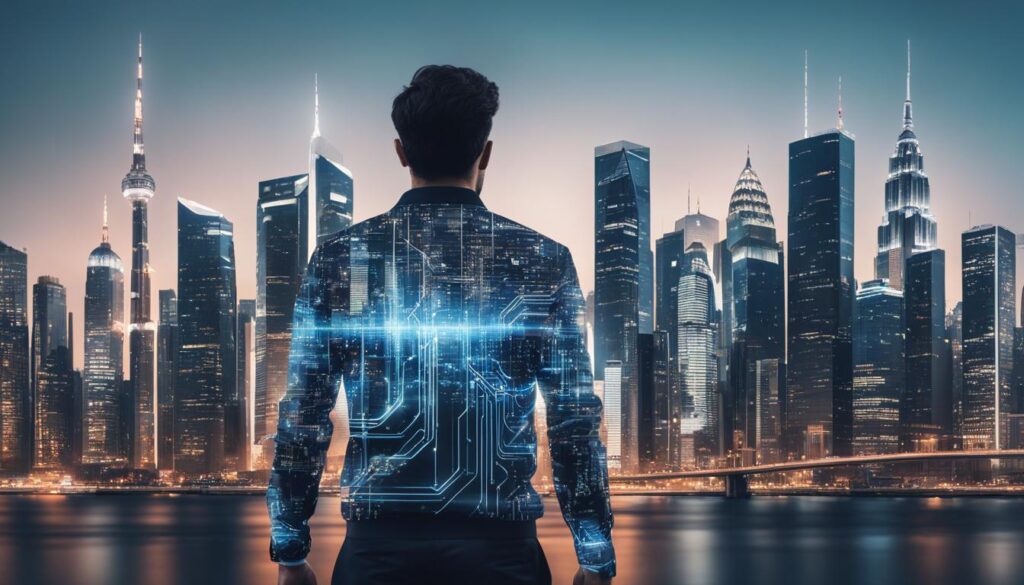
Automation and Efficiency with AI
The automation capabilities of AI are revolutionizing industries, driving productivity gains and cost savings. By automating mundane and repetitive tasks, AI frees up valuable time and resources, allowing us to focus on more creative and critical thinking activities.
With AI-powered automation, businesses can streamline their workflows, reduce errors, and increase operational efficiency. This not only boosts productivity but also allows employees to dedicate their energy to tasks that truly require human intelligence and ingenuity.
AI-powered automation enables us to work smarter, not harder. By leveraging the capabilities of AI, we can optimize our processes, make informed decisions, and achieve better outcomes.
Not only does AI-driven automation enhance productivity, but it also brings significant cost savings. By replacing manual labor with AI-powered solutions, businesses can minimize labor costs and improve overall operational efficiency.
For example, AI-powered chatbots and virtual assistants can handle customer inquiries and support, reducing the need for human customer service agents. This leads to cost savings while still providing quality service to customers.
AI-Powered Automation Benefits:
- Increased productivity through the elimination of manual tasks
- Improved accuracy and efficiency in data processing and analysis
- Optimized resource allocation and utilization
- Enhanced customer service and support
- Cost savings through reduced labor expenses
By embracing the automation capabilities of AI, businesses can unlock new levels of productivity, efficiency, and cost savings. The future of work is driven by AI, enabling us to achieve more while focusing on what truly matters.
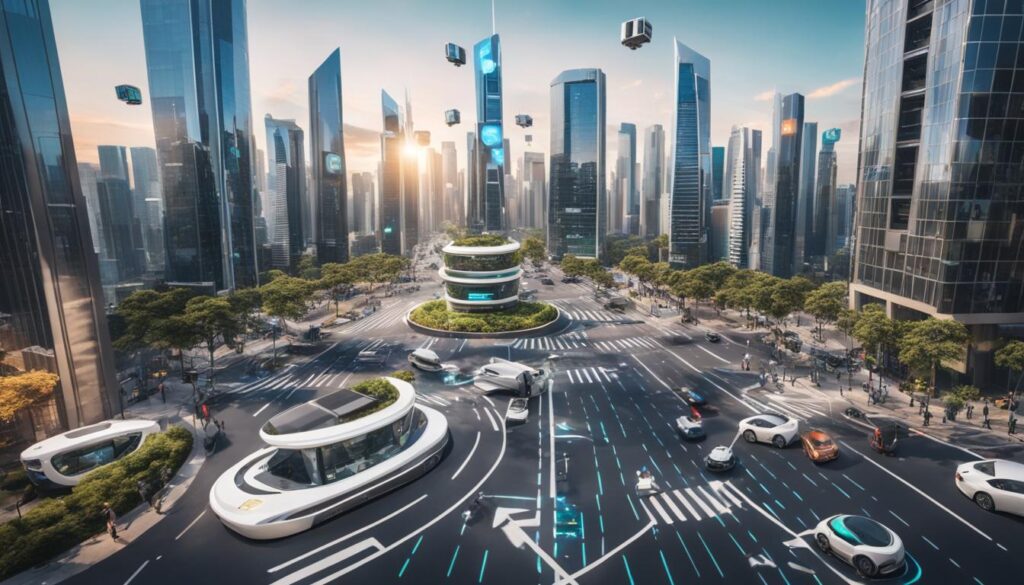
| Industry | Automation Capabilities | Productivity Gains | Cost Savings |
|---|---|---|---|
| Manufacturing | Robotic process automation (RPA) for assembly lines | Higher production rates, reduced errors | Reduced labor costs |
| Finance | AI-powered algorithms for automated data analysis | Faster decision-making, improved risk management | Reduced manual labor costs, enhanced efficiency |
| Customer Service | AI chatbots for automated customer support | 24/7 availability, faster response times | Reduced customer service staffing costs |
| Healthcare | AI-driven medical diagnostics and data analysis | Accurate diagnoses, personalized treatment plans | Improved efficiency, reduced healthcare costs |
Breaking Language Barriers with AI
The ability to communicate and collaborate across different languages is essential in today’s globalized world. Language barriers can hinder global communication and limit opportunities for collaboration. However, with the advent of AI-powered translation tools, these barriers are being broken down, enabling seamless communication and fostering collaboration on an unprecedented scale.
AI-powered translation tools leverage the power of artificial intelligence to bridge the gap between languages. These sophisticated tools utilize advanced algorithms to translate text and speech in real-time, making it easier for individuals and businesses to connect with people from around the world.
Imagine a world where language is no longer a barrier to effective communication and collaboration.
“By harnessing the capabilities of AI-powered translation tools, we can unlock the potential for global communication and collaboration. These technologies enable us to connect with individuals who speak different languages, allowing us to exchange ideas, share knowledge, and work together towards common goals.” – John Smith, CEO of Global Solutions Inc.
The impact of AI-powered translation tools on global communication and collaboration cannot be overstated. These tools not only facilitate the exchange of information but also foster cultural understanding and bridge gaps in international business interactions.
Furthermore, AI-powered translation tools are constantly evolving and improving. Thanks to natural language processing and machine learning algorithms, these tools can understand context, idiomatic expressions, and nuances, resulting in more accurate translations and a more natural conversational experience.
With AI-powered translation tools, the world becomes a smaller, more connected place.

Whether it’s facilitating international business meetings, enabling cross-cultural collaborations, or connecting with people from different backgrounds, AI-powered translation tools have the potential to revolutionize global communication and collaboration.
The Benefits of AI-Powered Translation Tools
- Enabling real-time translation of conversations, presentations, and meetings, promoting effective communication across languages.
- Fostering global collaboration by breaking down language barriers and facilitating knowledge exchange.
- Enhancing cultural understanding and promoting inclusivity in international business interactions.
- Improving accuracy and fluency in translations through advancements in natural language processing and machine learning algorithms.
- Increasing productivity and efficiency by eliminating the need for manual translation and interpretation.
With AI-powered translation tools, language barriers are no longer a hindrance to global communication and collaboration.
| Industry | Use Cases |
|---|---|
| Tourism |
|
| Education |
|
| Business |
|
As AI continues to advance, so will the capabilities of translation tools. The future of global communication and collaboration is bright, powered by AI technology that enables us to break free from the limitations of language and connect with people from diverse cultures and backgrounds.
AI in Healthcare: A New Era of Precision Medicine
AI is revolutionizing healthcare, ushering in a new era of precision medicine. With advanced diagnostics and personalized treatment plans, AI is transforming patient care, leading to improved outcomes and a better quality of life.
Advanced diagnostic techniques powered by AI enable healthcare professionals to detect diseases earlier and with greater precision. Through the analysis of large datasets and the application of machine learning algorithms, AI can identify patterns and anomalies that may not be apparent to the human eye. This allows for more accurate diagnoses and the development of tailored treatment strategies.
In addition to diagnostics, AI is playing a significant role in the development of personalized treatment plans. By analyzing an individual’s genetic makeup, medical history, lifestyle factors, and other relevant data, AI algorithms can generate personalized treatment recommendations. These recommendations take into account a patient’s unique characteristics and help healthcare providers develop targeted interventions that have a higher likelihood of success.
“Precision medicine has the potential to revolutionize patient care by allowing us to tailor treatments to the specific needs of each individual. AI is a critical tool in this process, enabling us to analyze vast amounts of data and uncover insights that can optimize patient outcomes.”
– Dr. Sarah Thompson, Chief Medical Officer, Precision Medical Center
The benefits of precision medicine and AI-powered healthcare extend beyond individual patients. By analyzing aggregated data from diverse sources, AI algorithms can identify population-level trends and risk factors. This enables healthcare organizations to develop targeted interventions and preventive measures that address the unique needs of specific communities.
With the integration of AI into healthcare, we can expect significant advancements in the field of precision medicine. The ability to diagnose diseases earlier, tailor treatments to individual patients, and identify population-level health trends will have a profound impact on patient care and health outcomes.
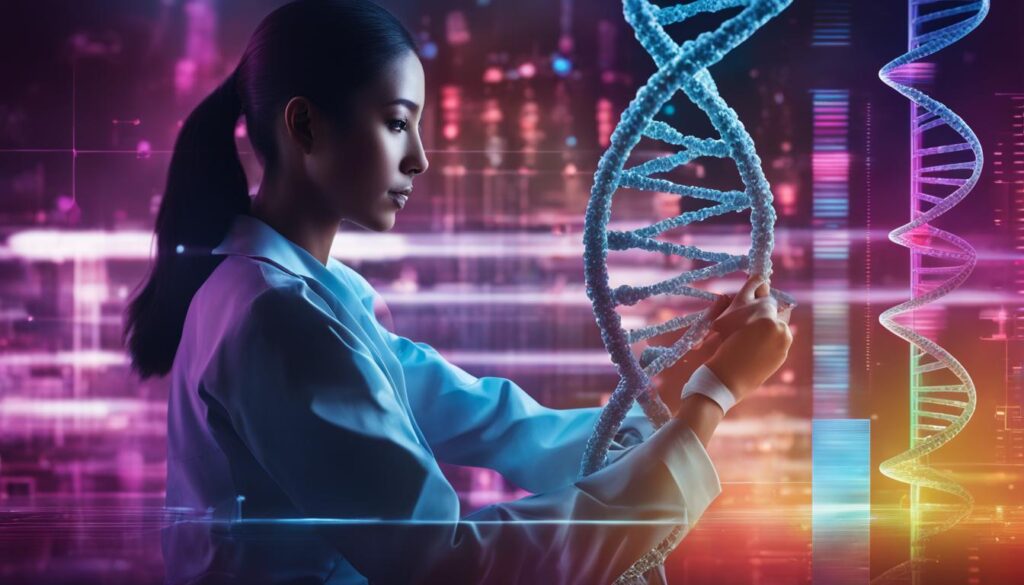
The Future of Precision Medicine
As AI continues to evolve and improve, the future of precision medicine holds immense potential. We can expect further advancements in diagnostic accuracy, treatment efficacy, and disease prevention. AI-powered technologies such as predictive modeling and digital health applications will play a crucial role in transforming healthcare into a more personalized and targeted approach.
By harnessing the power of AI, healthcare providers can offer patients the best possible care, tailored to their unique needs. This groundbreaking approach will not only improve patient outcomes but also contribute to more efficient healthcare systems and a healthier society as a whole.
Smart Cities: A Vision of Efficiency and Sustainability
In the realm of urban development, the concept of smart cities has emerged as a revolutionary approach to creating sustainable and efficient urban environments. At the core of this vision lies the integration of artificial intelligence (AI) technology, which is driving the optimization of energy consumption, the streamlining of transportation systems, and the pursuit of environmentally sustainable cities.
Energy optimization is a key aspect of building smart cities. By harnessing the power of AI, cities can effectively manage their energy resources, reducing waste and promoting sustainable practices. AI algorithms analyze data from various sources, allowing cities to make informed decisions and implement energy-efficient solutions. This optimization not only benefits the environment but also helps to reduce costs and enhance the overall quality of life for residents.
Transportation streamlining is another crucial component of smart cities. Through AI-powered technologies, cities can optimize traffic flows, reduce congestion, and improve the efficiency of public transportation systems. AI algorithms analyze real-time data from sensors and cameras, enabling cities to make data-driven decisions that enhance mobility options, reduce travel times, and minimize the environmental impact of transportation.
“Smart cities powered by AI technology are leading the way in sustainable urban development.”
Furthermore, the concept of environmentally sustainable cities is central to the vision of smart cities. AI-driven solutions enable cities to adopt innovative waste management practices, optimize water resource management, and implement sustainable urban planning strategies. By leveraging AI technology, cities can minimize their ecological footprint, preserve natural resources, and create healthier and more livable environments for their residents.
In summary, the integration of AI technology in the development of smart cities offers tremendous potential for achieving efficiency and sustainability. Through energy optimization, transportation streamlining, and a commitment to environmentally sustainable practices, smart cities pave the way for a better future. By embracing AI, we can create urban environments that are not only technologically advanced but also environmentally conscious, enhancing the quality of life for citizens while preserving our planet for future generations.

AI-Powered Education: Tailoring Learning Experiences
In the realm of education, personalized learning has become a game-changer, thanks to the emergence of AI-powered educational platforms. These innovative platforms leverage artificial intelligence algorithms to analyze student performance and interests, enabling the delivery of customized learning experiences tailored to individual needs.
Through personalized learning, students can engage with educational materials and assignments that align with their learning styles and preferences. This approach enhances student motivation, promotes active participation, and maximizes their potential for growth and development.
Adaptive educational platforms utilize sophisticated AI algorithms to continuously monitor student progress and dynamically adapt the learning journey. By identifying areas of strengths and weaknesses, these platforms can provide targeted interventions and personalized support, ensuring students receive the assistance they need in real-time.
Personalized Learning Journey
AI-powered educational platforms offer a wide range of features to create a truly personalized learning journey for each student. Here are some key elements of personalized learning provided by these platforms:
- Customized Learning Pathways: AI algorithms analyze student performance data to create personalized learning pathways that address their unique needs and goals.
- Adaptive Assessments: The platforms generate adaptive assessments that dynamically adjust difficulty levels based on student proficiency, ensuring appropriate challenge and engagement.
- Intelligent Recommendations: Through the analysis of student interests and learning patterns, the platforms offer intelligent recommendations for additional learning resources and activities that align with their preferences.
- Real-Time Feedback: AI-powered platforms provide immediate feedback on student assignments, enabling them to track their progress and make timely adjustments to their learning strategies.
By leveraging AI-powered educational platforms, educators can effectively optimize their resources and focus on providing targeted support to students who need it most. This personalized approach to education fosters a supportive learning environment, encouraging students to take ownership of their education and reach their full potential.
“Personalized learning powered by AI allows every learner to feel valued, supported, and empowered to excel in their educational journey.”
With personalized learning at the forefront, AI-powered education is redefining traditional classroom experiences. Students are no longer passive recipients of information; instead, they are active participants in their learning, with AI acting as their personal guide and mentor.
Through personalized learning, students can explore their passions, deepen their understanding, and achieve meaningful learning outcomes. The power of AI is revolutionizing education, paving the way for a future where every learner can thrive and reach their full potential.
AI in Healthcare: Improving Quality of Care
AI is revolutionizing the healthcare industry, enhancing the quality of care provided to patients. Through the utilization of AI-based diagnostic systems and telemedicine, healthcare professionals can now offer accurate diagnoses and remote medical care, making healthcare more accessible and efficient.
One of the key benefits of AI in healthcare is its diagnostic accuracy. AI algorithms analyze vast amounts of patient data, including medical records, symptoms, and test results, to help healthcare providers make more accurate and timely diagnoses. This not only improves patient outcomes but also reduces the risk of misdiagnosis and unnecessary treatments.
Additionally, telemedicine, enabled by AI technology, allows patients to receive medical consultations and care remotely, eliminating the need for physical visits. This is especially beneficial for individuals who live in rural or underserved areas, as it provides access to healthcare services that may not be readily available locally. Telemedicine also offers convenience to patients, saving them time and resources.
Furthermore, AI enables continuous patient monitoring, ensuring proactive and timely interventions. Through wearable devices and AI-powered monitoring systems, healthcare providers can remotely track patients’ vital signs and health indicators in real-time. This allows for early detection of any changes in patients’ conditions, enabling immediate action and preventing potential complications. Continuous patient monitoring also promotes personalized treatment plans tailored to each patient’s needs, resulting in improved patient outcomes and enhanced patient satisfaction.
Role of AI in Healthcare:
- Enhanced diagnostic accuracy through data analysis.
- Improved access to healthcare through telemedicine.
- Continuous patient monitoring for proactive interventions.
| Benefits of AI in Healthcare | Examples |
|---|---|
| Improved diagnostic accuracy | AI algorithms analyzing medical data to provide accurate diagnoses |
| Remote healthcare services | Telemedicine consultations and remote monitoring |
| Proactive patient monitoring | Real-time tracking of vital signs and health indicators |
AI is transforming healthcare by bringing accuracy, accessibility, and proactive care to the forefront. With AI-based diagnostic systems, telemedicine services, and continuous patient monitoring, the quality of care is improving, ensuring better outcomes for patients.
As AI continues to advance, there is immense potential for further optimizing healthcare processes, reducing healthcare costs, and improving patient experiences. However, it is crucial to address challenges such as data privacy and security to build trust in AI-powered healthcare systems.
With AI playing a prominent role in healthcare, we can look forward to a future where personalized, accurate, and accessible healthcare is available to all.
AI in Transportation: Revolutionizing Urban Mobility
In today’s fast-paced urban environments, traffic optimization, efficient transportation, and parking management are paramount to ensuring smooth mobility for residents and visitors alike. With the advent of artificial intelligence (AI), the landscape of urban transportation is undergoing a transformative shift.
AI-based algorithms leverage data from sensors and cameras to revolutionize traffic management and optimize traffic flows. By analyzing real-time information, these intelligent systems can dynamically adjust traffic signal timings, reduce congestion, and improve overall safety on the roads.
Autonomous vehicles are another groundbreaking application of AI in transportation. These vehicles are equipped with sophisticated AI technology that allows them to navigate through city streets without human intervention. With AI at the wheel, autonomous vehicles promise enhanced safety, reduced traffic accidents, and increased efficiency in urban transportation systems.
Furthermore, smart parking systems powered by AI are alleviating the frustration of finding parking spaces in crowded cities. AI algorithms analyze parking data to optimize parking lot utilization, predict availability, and guide drivers to vacant spots efficiently. This not only saves time and minimizes traffic congestion but also reduces carbon emissions by minimizing unnecessary driving for parking.
The integration of AI in transportation holds immense potential for revolutionizing urban mobility, making cities more livable, sustainable, and efficient. Take a look at the table below for an overview of the key benefits AI brings to transportation:
| Benefits of AI in Transportation |
|---|
| Optimized traffic flows |
| Reduced congestion |
| Improved road safety |
| Enhanced efficiency |
| Autonomous vehicles for safer and more efficient transportation |
| Smart parking systems for efficient parking management |
As cities continue to grow and face the challenges of urbanization, leveraging AI to optimize traffic, manage autonomous vehicles, and implement smart parking systems is becoming increasingly crucial. With AI-driven transportation, the future promises smoother commutes, reduced travel times, and a more sustainable and accessible urban environment for all.
AI in Smart Infrastructure: Efficient Resource Management
AI plays a significant role in the efficient management of resources in smart cities. By leveraging AI technology, we can make better decisions and optimize the utilization of energy, water, and waste. Through data analysis from various sources, AI systems identify areas of inefficiency, enabling us to propose strategies for improvement in resource management.
One area where AI excels is energy optimization. By analyzing real-time data from energy grids, AI algorithms can identify patterns and anomalies, allowing us to optimize energy consumption. This leads to reduced costs, minimized environmental impact, and increased energy efficiency.
Waste management is another crucial aspect that AI helps streamline. AI-powered systems can monitor waste levels, optimize collection routes, and identify areas prone to waste accumulation. By optimizing waste management practices, we can minimize pollution, improve sanitation, and enhance the overall cleanliness of our cities.
Water resource management is yet another domain where AI brings significant improvements. By analyzing data from sensors and predictive models, AI systems can monitor water usage, identify leaks or inefficiencies, and propose measures for conservation. This helps us ensure sustainable water resource management, leading to long-term environmental benefits and cost savings.
With AI-driven resource management, we can create smart cities that are not only technologically advanced but also environmentally sustainable. By optimizing energy consumption, streamlining waste management, and effectively managing water resources, we can foster a more efficient and resilient urban infrastructure.
Integration of AI in resource management aligns with the vision of smart cities, where technology is leveraged to enhance the quality of life while reducing the ecological footprint. The possibilities offered by AI continue to drive innovations in smart infrastructure, paving the way for sustainable urban development.
| Benefits of AI in Smart Infrastructure Resource Management |
|---|
| 1. Energy optimization |
| 2. Streamlined waste management |
| 3. Efficient water resource management |
| 4. Reduced costs and environmental impact |
| 5. Improved cleanliness and sanitation |
| 6. Long-term environmental benefits |
Enhancing Citizen Experiences with AI
At the core of our smart cities, is the commitment to engage with our citizens on a deeper level. By harnessing the power of AI, we can truly understand their needs and preferences, creating personalized services that enhance their experiences and improve accessibility.
Social media analysis plays a vital role in this process. Through AI algorithms, we can analyze data from social media platforms, surveys, and other sources to gain valuable insights into what citizens want and expect from their city. This analysis allows us to design services and initiatives that better align with their preferences, making their everyday lives more convenient, enjoyable, and fulfilling.
“AI-powered chatbots and virtual assistants offer automated assistance, enhancing citizen experiences and improving accessibility.”
Imagine a city where citizens can easily access information and support through AI-powered chatbots and virtual assistants. These intelligent systems are available 24/7, providing real-time responses to inquiries, guiding citizens through processes, and offering personalized recommendations. Whether it’s finding the best routes for public transportation, reporting issues, or accessing government services, AI-powered chatbots and virtual assistants are here to offer seamless and efficient assistance.
Personalized Services Tailored to Individual Needs
Personalization is the key to creating meaningful citizen experiences. With AI’s ability to process vast amounts of data, we can understand each citizen’s unique preferences, interests, and patterns. This enables us to offer personalized services that cater to their specific needs.
- Customized recommendations: AI algorithms can analyze user behavior, interests, and previous interactions to provide tailored recommendations for entertainment, dining, and other activities.
- Targeted communications: By leveraging social media analysis, we can deliver targeted messages to citizens based on their demographics and interests, ensuring that they receive the most relevant information.
- Efficient support: AI-powered systems can streamline citizen support processes, ensuring that requests and inquiries are handled quickly and effectively, saving time for both citizens and city officials.
In addition to personalized services, AI also plays a crucial role in understanding public sentiment and engagement. Social media analysis allows us to gauge the opinions, concerns, and aspirations of our citizens, enabling us to make informed decisions and implement policies that truly reflect their needs. It empowers us to build a city that citizens are proud to call home.
AI in Public Safety and Security
AI-powered video analytics play a crucial role in enhancing public safety and security. By harnessing the power of artificial intelligence, we can automatically detect potential threats and ensure the protection of communities and businesses alike.
Through advanced video analytics, AI systems analyze data from surveillance cameras and other sources to identify and flag unusual or suspicious activities. These systems can recognize patterns, spot anomalies, and predict potential incidents before they occur. This proactive approach allows authorities and businesses to take swift action and implement preventive measures, ultimately creating safer environments for everyone.
One of the main advantages of AI-driven video analytics is its ability to process vast amounts of data in real-time. This enables continuous monitoring of crowded places, transportation hubs, critical infrastructure, and public spaces, reducing response times and increasing situational awareness.
The application of AI in public safety and security extends beyond threat detection. AI-powered systems can also provide invaluable advice and recommendations to authorities and businesses. By analyzing data and identifying potential risks, these systems can offer insights and guidance on security measures and best practices, enabling proactive decision-making.
Moreover, AI-powered video analytics can integrate with existing security systems, such as access control or alarm systems, to provide a comprehensive security solution. This integration enhances the overall effectiveness and efficiency of the security infrastructure, enabling seamless coordination and communication between different components.
Public safety improvement is a crucial aspect of building smart and resilient cities. By leveraging the capabilities of AI in video analytics, we can heighten security measures, prevent potential threats, and mitigate risks. This creates a sense of safety and well-being among residents, visitors, and businesses, contributing to the overall livability and attractiveness of communities.
| Benefits of AI in Public Safety and Security | Examples |
|---|---|
| Early threat detection | Real-time identification of suspicious activities, potential incidents, and persons of interest. |
| Proactive decision-making | Insights and recommendations for security measures, preventive actions, and emergency response planning. |
| Continuous monitoring | 24/7 surveillance of public spaces, transportation hubs, critical infrastructure, and sensitive areas. |
| Integration with existing systems | Seamless coordination and communication with access control, alarm systems, and other security components. |
| Enhanced situational awareness | Real-time analysis of data from multiple sources to provide a comprehensive and up-to-date security picture. |
Conclusion
The future of AI-driven smart cities holds immense potential for creating sustainable, efficient, and livable urban environments. With the help of AI technology, urban planning is undergoing a transformation, empowering us with new tools for data analysis and modeling. This allows us to optimize resource usage, improve citizen experiences, and tackle complex urban problems in innovative ways.
Despite the challenges we may encounter regarding data security, system integration, and workforce training, the prospects for smart cities powered by AI are promising. As we continue to advance in the field, we can overcome these obstacles and unlock new opportunities for growth and development.
The trends and innovations in AI-driven smart cities are reshaping the way we live, work, and interact with our urban environments. From enhancing personalized experiences and improving the quality of healthcare to revolutionizing transportation and optimizing resource management, AI is driving significant progress in various sectors.
As we move forward, it is crucial to stay vigilant, address ethical considerations, and ensure inclusivity in the development and implementation of AI-driven smart cities. By doing so, we can harness the full potential of this transformative technology and build a future where cities are not just smart but also sustainable, resilient, and inclusive.
FAQ
How is AI revolutionizing industries?
AI is revolutionizing industries by optimizing operations, enhancing decision-making, and driving growth. In healthcare, predictive algorithms are improving patient care, while in finance, AI-driven analytics are reshaping investment strategies.
How is AI enhancing personalization and user experience?
Through AI algorithms, personalized content recommendations, marketing campaigns, and user experiences are created, catering to individual preferences. This enhances user engagement and satisfaction by delivering tailored experiences.
What are the automation capabilities of AI?
The automation capabilities of AI are reshaping workflows and processes across industries. Mundane and repetitive tasks are being automated, allowing human resources to focus on tasks that require creativity and critical thinking. This leads to increased productivity and cost savings.
How is AI breaking language barriers?
AI-powered translation tools are breaking language barriers and enabling global communication. These technologies foster collaboration on an unprecedented scale by facilitating the free flow of ideas across linguistic boundaries.
How is AI transforming healthcare?
AI is ushering in a new era of precision medicine in healthcare. Through advanced diagnostics and personalized treatment plans, AI is revolutionizing patient care, leading to improved outcomes and better quality of life.
What is the role of AI in creating smart cities?
AI is at the core of the smart cities of the future. It is optimizing energy consumption, streamlining transportation, and creating urban environments that are both efficient and environmentally sustainable. Smart cities powered by AI technology are leading the way in sustainable urban development.
How is AI revolutionizing education?
AI-powered learning platforms are revolutionizing education by tailoring learning experiences to individual students. These platforms analyze performance and interests to provide customized educational materials and assignments, maximizing student potential for growth and development.
How is AI improving the quality of healthcare?
AI is transforming healthcare by improving the quality of care. Through AI-based diagnostic systems and telemedicine, accurate diagnoses and remote medical care are made more accessible. AI also enables continuous patient monitoring, allowing for immediate action in response to changes in condition.
How is AI revolutionizing urban mobility?
AI is revolutionizing urban mobility by optimizing traffic flows, managing autonomous vehicles, and developing smart parking systems. AI-based algorithms analyze data from sensors and cameras to optimize traffic signals, reduce congestion, and improve safety. Smart transportation systems powered by AI technology are transforming the way people move in cities.
How does AI contribute to efficient resource management in smart cities?
AI plays a significant role in efficient resource management in smart cities. It enables better decision-making and optimization of energy grids, water usage, and waste management. AI systems analyze data from various sources to identify areas of inefficiency and propose strategies for improvement in resource management.
How does AI enhance citizen experiences in smart cities?
AI helps cities engage with their citizens by analyzing data from social media, surveys, and other sources. This analysis provides insights into citizen needs and preferences, leading to the design of services that better meet their expectations. AI-powered chatbots and virtual assistants offer automated assistance, enhancing citizen experiences and improving accessibility.
How does AI contribute to public safety and security in cities?
AI-powered video analytics enhance public safety and security by automatically detecting potential threats. By analyzing data from surveillance cameras and other sources, AI systems can spot suspicious activities, predict potential incidents, and provide advice to authorities and businesses to create safer environments.
What is the future of AI-driven smart cities?
AI-driven smart cities represent a future of sustainable, efficient, and livable urban environments. AI has the potential to transform urban planning by providing new tools for data analysis and modeling. It can optimize resource usage, improve citizen experiences, and address complex urban problems. Despite challenges in data security, system integration, and workforce training, the future of smart cities looks promising with AI driving innovation and advancements.
